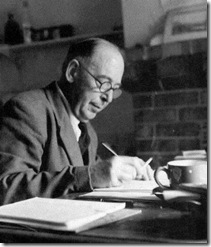 In the last chapter I had to touch on the subject of prayer, and while that is still fresh in your mind and my own, I should like to deal with a difficulty that some people find about the whole idea of prayer. A man put it to me by saying ‘I can believe in God all right, but what I cannot swallow is the idea of Him attending to several hundred million human beings who are all addressing Him at the same moment.’ And I have found that quite a lot of people feel this.
In the last chapter I had to touch on the subject of prayer, and while that is still fresh in your mind and my own, I should like to deal with a difficulty that some people find about the whole idea of prayer. A man put it to me by saying ‘I can believe in God all right, but what I cannot swallow is the idea of Him attending to several hundred million human beings who are all addressing Him at the same moment.’ And I have found that quite a lot of people feel this.
Now, the first thing to notice is that the whole sting of it comes in the words at the same moment. Most of us can imagine God attending to any number of applicants if only they came one by one and He had an endless time to do it in. So what is really at the back of this difficulty is the idea of God having to fit too many things into one moment of time.
Well that is of course what happens to us. Our life comes to us moment by moment. One moment disappears before the next comes along: and there is room for very little in each. That is what Time is like. And of course you and I tend to take it for granted that this Time series—this arrangement of past, present and future—is not simply the way life comes to us but the way all things really exist. We tend to assume that the whole universe and God Himself are always moving on from past to future just as we do. But many learned men do not agree with that. It was the Theologians who first started the idea that some things are not in Time at all: later the Philosophers took it over: and now some of the scientists are doing the same.  Almost certainly God is not in Time. His life does not consist of moments following one another. If a million people are praying to Him at ten-thirty tonight, He need not listen to them all in that one little snippet which we call ten-thirty. Ten- thirty—and every other moment from the beginning of the world—is always the Present for Him. If you like to put it that way, He has all eternity in which to listen to the split second of prayer put up by a pilot as his plane crashes in flames.
Almost certainly God is not in Time. His life does not consist of moments following one another. If a million people are praying to Him at ten-thirty tonight, He need not listen to them all in that one little snippet which we call ten-thirty. Ten- thirty—and every other moment from the beginning of the world—is always the Present for Him. If you like to put it that way, He has all eternity in which to listen to the split second of prayer put up by a pilot as his plane crashes in flames.
That is difficult, I know. Let me try to give something, not the same, but a bit like it. Suppose I am writing a novel. I write ‘Mary laid down her work; next moment came a knock at the door!’ For Mary who has to live in the imaginary time of my story there is no interval between putting down the work and hearing the knock. But I, who am Mary’s maker, do not live in that imaginary time at all. Between writing the first half of that sentence and the second, I might sit down for three hours and think steadily about Mary. I could think about Mary as if she were the only character in the book and for as long as I pleased, and the hours I spent in doing so would not appear in Mary’s time (the time inside the story) at all.  This is not a perfect illustration, of course. But it may give just a glimpse of what I believe to be the truth. God is not hurried along in the Time-stream of this universe any more than an author is hurried along in the imaginary time of his own novel, He has infinite attention to spare for each one of us. He does not have to deal with us in the mass. You are as much alone with Him as if you were the only being He had ever created. When Christ died, He died for you individually just as much as if you had been the only man in the world.
This is not a perfect illustration, of course. But it may give just a glimpse of what I believe to be the truth. God is not hurried along in the Time-stream of this universe any more than an author is hurried along in the imaginary time of his own novel, He has infinite attention to spare for each one of us. He does not have to deal with us in the mass. You are as much alone with Him as if you were the only being He had ever created. When Christ died, He died for you individually just as much as if you had been the only man in the world.
The way in which my illustration breaks down is this. In it the author gets out of one Time-series (that of the novel) only by going into another Time-series (the real one). But God, I believe, does not live in a Time-series at all. His life is not dribbled out moment by moment like ours: with Him it is, so to speak, still 1920 and already 1960. For His life is Himself.
C.S. Lewis, Mere Christianity (1952; Harper Collins: 2001) 166-168.
No comments:
Post a Comment